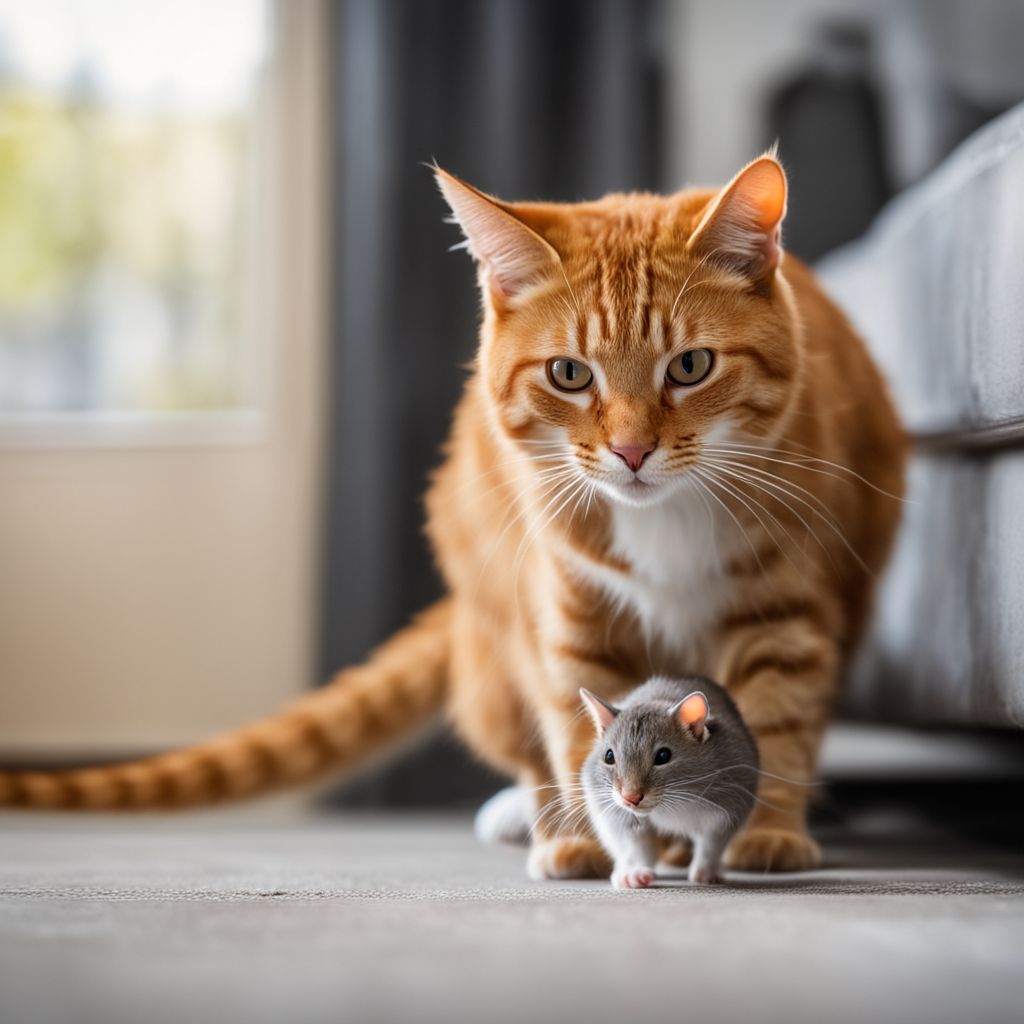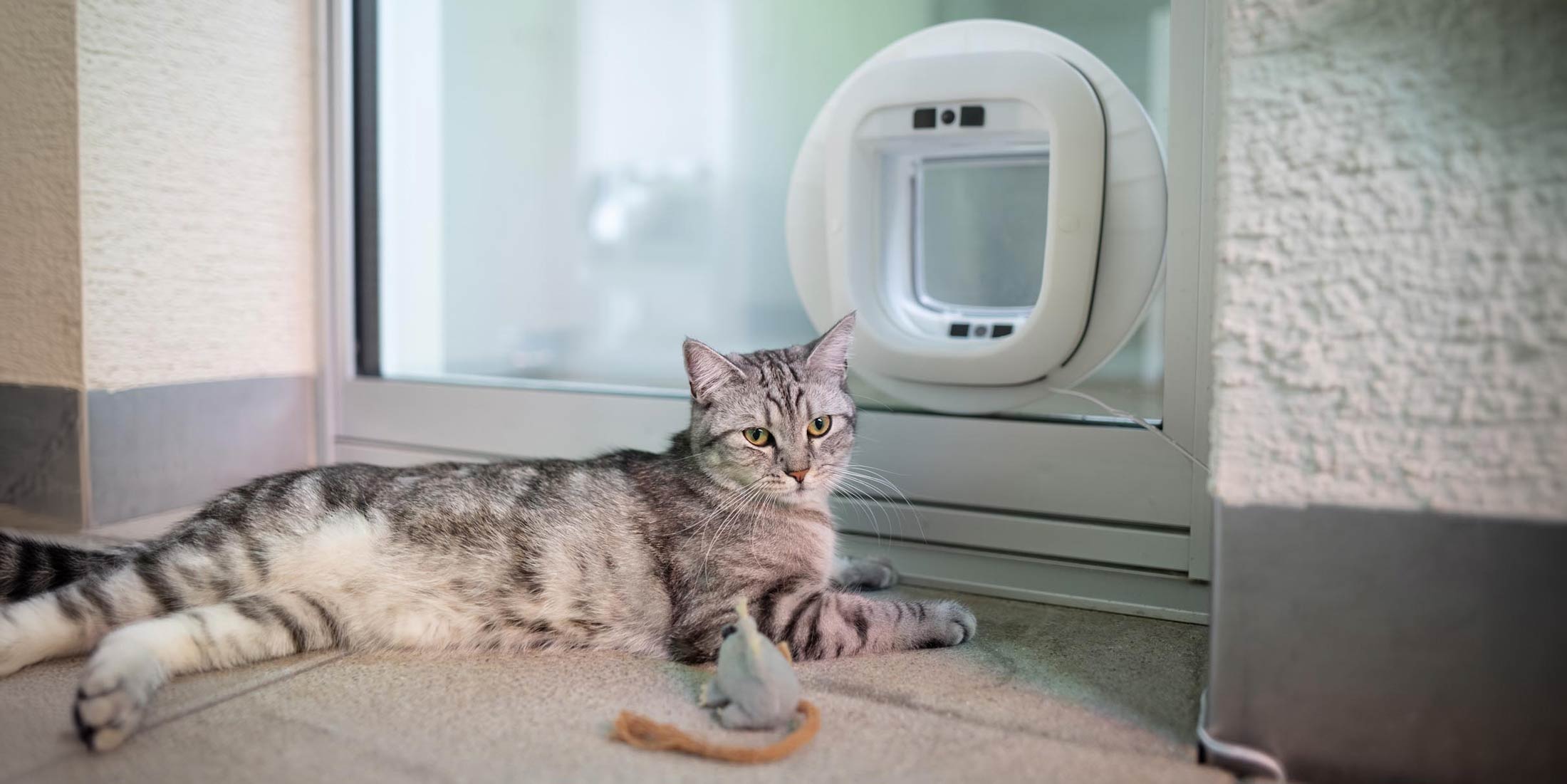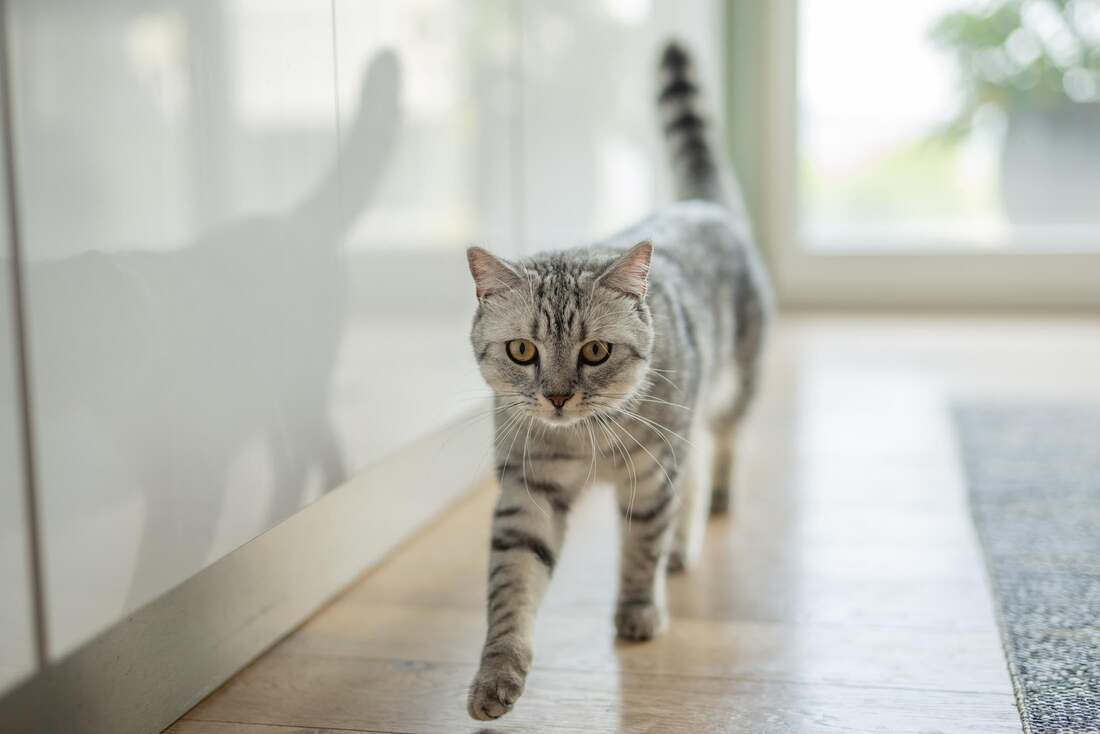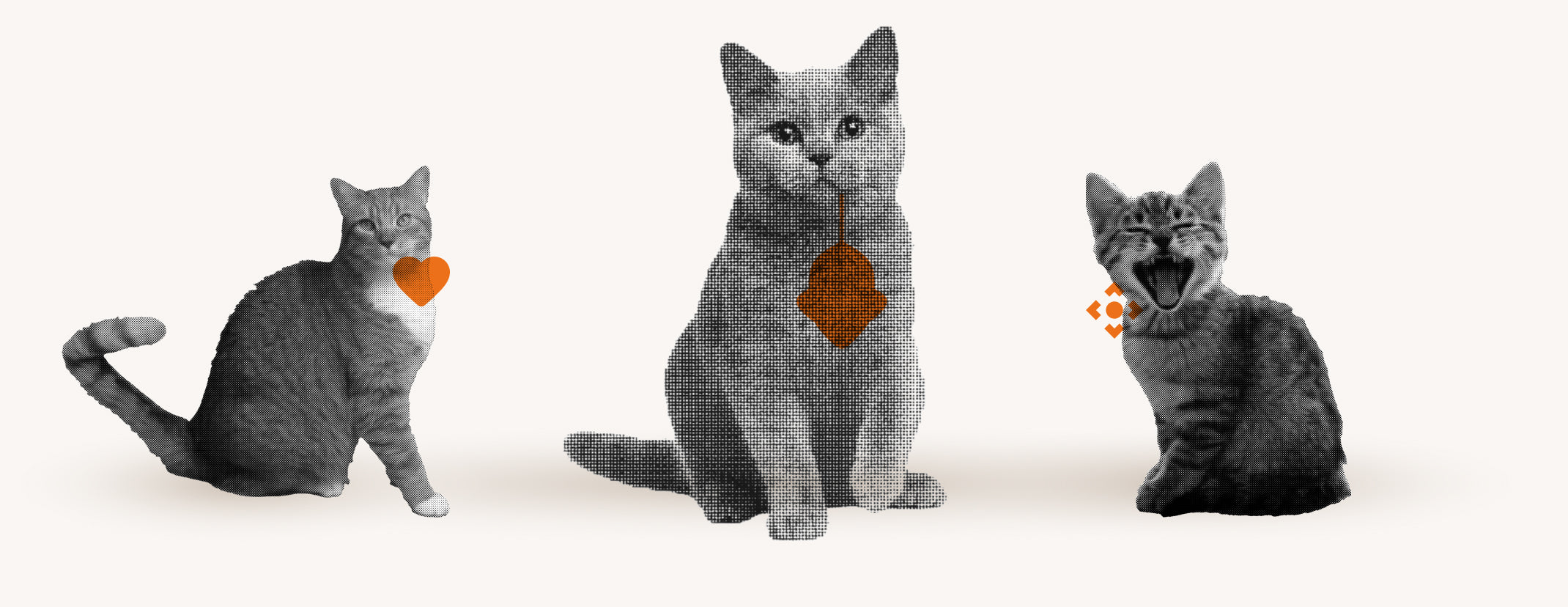Imagine you suddenly find a live mouse in your living room – brought by your cat through the cat flap.
It's your cat's natural instinct, but that doesn't make the problem with unwanted rodents any less frustrating.
The best solution is to create a safety corridor directly behind the cat flap so that you can catch the mouse before it gets into the house.
In this article, you will learn why cats bring mice home, what problems they cause, and how you can prevent them from coming home with smart tips and technologies.
Why does your cat bring mice home?

Have you ever wondered why your cat brings mice home? It's in their nature as a born hunter . Even if your cat is fed regularly and has a comfortable home, the hunting instinct remains strongly ingrained in them. This instinct is a relic from the time when cats lived in the wild and had to hunt to survive.
Mother cats teach their kittens to hunt by bringing home live or dead prey. This behavior may explain why your adult cat also brings home mice. She may think you need help hunting, or she may see it as part of her role in your collective "pack."
In addition to the educational aspect, there are other reasons for this behavior:
- Practice and play : Cats perfect their hunting skills by playing with their prey.
- Territorial behavior : Bringing prey is a sign that she feels safe in your home.
- Instinctive action : Sometimes cats bring prey without any apparent reason, simply because it is their instinct.
It's also possible that your cat sees hunting as a form of entertainment or pastime. Bringing back the prey could be a way to keep herself occupied while also fulfilling her role as the hunter in the family.
While there are many theories as to why cats bring mice home, it's important to understand that this is a natural behavior . It's not something your cat does to annoy you or because she's being cruel. It's simply part of who she is - a skilled hunter with deep-rooted instincts.
Recognizing and understanding problems caused by mice in the house
Mice are cute to look at, but if they get into your home, they can cause serious problems . Not only do they multiply quickly and cause damage, they also pose health risks . It's important to recognize the signs of a mouse infestation early to avoid bigger problems.
First of all, mice leave behind droppings and urine that may contain pathogens. This is particularly dangerous in kitchens or where food is stored. The health risks should not be underestimated, as mice can transmit diseases such as salmonella, leptospirosis and hantaviruses.
There are some signs that indicate mice in the house:
- Gnawing marks on food packaging or furniture
- Feces traces that resemble small, dark grains
- Walkways that become visible due to traces of grease and dirt
In addition to hygiene and health problems, mice can also cause structural damage . They chew on cables, which can lead to short circuits and even fires. They also damage insulation materials and can therefore affect the energy efficiency of your home.
Another problem is that mice can trigger or worsen allergies and asthma . Their hair, dander and droppings are allergens that can cause reactions in sensitive people. This is especially a risk for children and people with weak immune systems.
Last but not least, the emotional impact of a mouse infestation should not be underestimated. Knowing that mice are in the house can be very worrying for some people and can lead to feelings of unease and insecurity. So it is important to act quickly if you notice signs of a mouse infestation.
How to prevent your cat from bringing mice

Cats are hunters by nature and it can be difficult to stop them from bringing prey home. However, there are strategies that can help change your cat's behavior. One option is to regulate the times when the cat flap is open. If you limit the times your cat can go outside to daylight hours, you reduce the chance that it will catch nocturnal prey such as mice.
Another effective method is to keep your cat busy indoors . Cats who are bored are more likely to hunt outside. Make sure she has plenty of toys and keep her busy with interactive games :
- hide-and-seek games with treats
- intelligence toy that stimulates them to think
- Play fishing rods that satisfy their hunting instinct
High-quality food can also make a difference. One study has shown that cats fed high-quality meat-based food hunt less. It is important that you provide your cat with a balanced diet that meets their natural needs. This will make them less likely to go outside to look for additional food.
Sometimes it can help to make the outdoor environment less inviting for hunting. Try to design the garden to be less attractive to mice:
- Keep the grass short
- Remove hiding places such as piles of wood or leaves
- Use natural predators of mice, such as owls or hawks
Finally, training your cat can help reduce bringing mice. Reward her when she comes home without prey, and ignore her when she arrives with prey. This can help her learn that she gets more attention without prey. Patience and consistency are the keys to success here.
First Aid: Your Cat Has Brought a Mouse

If your cat has brought a mouse home, you need to act quickly. Stay calm and try to control the situation by catching the mouse safely. You can do this by wearing gloves and having a container ready to secure the mouse in and then take it outside.
It is important that you do not punish your cat . She is just following her natural instinct and does not understand that her behavior is undesirable. Instead, you should use positive reinforcement to discourage her from bringing mice. Praise her when she comes home without any prey and ignore her if she brings a mouse.
To reduce the amount of mice brought in, there are some training methods you can use:
- Play and Activity : Provide your cat with plenty of toys and interactive games to satisfy its hunting instinct at home.
- Adjust feeding times : Feed your cat at set times so that he is less motivated to search outside for food.
- Controlled outdoor access : Limit the times your cat is allowed outside, especially at night when mice are more active.
Another option is to make your cat's home as comfortable and inviting as possible. If she feels comfortable inside, she will feel less of a need to hunt outside. Provide her with comfortable places to lie down and provide a calm and stress-free environment .
Remember that it may take time for your cat's behavior to change. Be patient and be consistent with your training methods. With time and the right measures, you can significantly reduce your cat's ability to bring mice home.
Smart cat flaps from Flappie – technology meets comfort
Imagine if you could solve the problem of mice that your cat brings home once and for all . With the Flappie smart cat flap, you can. This flap is not only an easy way to pass through, but it is equipped with advanced technology that detects prey animals and thus prevents your cat from bringing unwanted guests. The advantages are obvious:
- Selective access control : Only your cat can pass, no prey.
- AI-supported prey detection : A camera identifies animals brought along and denies entry.
But how does it work exactly? The flap is equipped with a camera and artificial intelligence (AI) . This combination ensures that the flap recognizes when your cat tries to get into the house with a mouse. Then the flap stays closed . You will be informed immediately via the Flappie app and can see pictures or videos of your cat - of course only when it is out and about without prey. This gives you full control and a convenient overview of your cat's comings and goings. Visit flappie.ch now to find out more and secure your pre-sale discount !
Frequently Asked Questions
How do you stop cats from bringing mice into your house?
There are several strategies you can use to prevent cats from bringing mice into your home: You can limit the cat flap's opening times to daylight hours, as mice are nocturnal. Keep your cat occupied indoors with plenty of toys and interactive games to satisfy their hunting instincts at home. High-quality food can also help, as cats with a balanced diet hunt less. Additionally, training your cat can help reduce bringing mice by rewarding them when they come home without prey and ignoring them when they arrive with prey. The outdoor environment can also be made less inviting for mice by keeping the grass short and removing hiding places such as woodpiles or leaves.
What to do if the cat brings a mouse?
If your cat has brought a mouse home, stay calm and catch the mouse safely. Wear gloves and use a container to secure the mouse and take it outside. Instead of punishing your cat for its natural behavior, use positive reinforcement to discourage it from bringing mice. Praise it when it comes home empty-handed and offer it plenty of toys and interactive games. Feed your cat at set times and limit the times it is allowed outside, especially at night.
Which cat flap detects mice?
The Flappie smart cat flap is equipped with advanced technology that detects prey animals and thus prevents your cat from bringing unwanted guests. It has a camera and artificial intelligence (AI) that identifies the animals brought in and then denies entry. Only the cat can pass through, not prey.
Can you stop cats from catching mice?
It can be difficult to completely stop cats from catching mice, as it is a natural instinct. However, there are methods to change the behavior, such as regulating the times the cat flap is open, keeping the cat occupied with toys and interactive games, offering high-quality food, and training your cat. These methods can help reduce the number of mice brought home. It is important to be patient and consistent in applying the training methods.





Share:
How old are cats in human years?